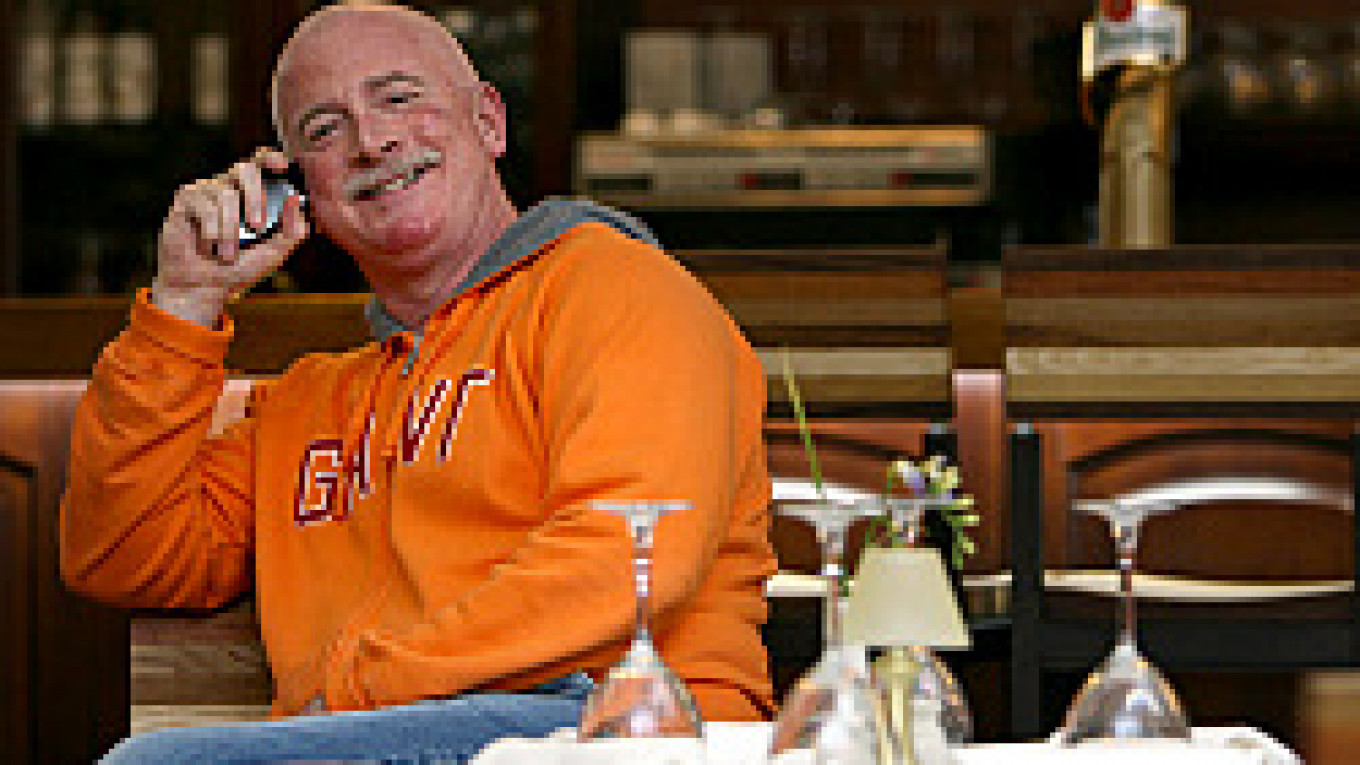Like any self-respecting Nova Scotian, Steele said: "Let's open up a bar."
Today, Steele is the city's best-known foreign restaurateur. But in 1993, he had never owned or operated a watering hole and was not particularly well informed about the goings-on in newly post-Soviet Russia. Nevertheless, within a year he opened a bar called the Moosehead, in honor of his Canadian roots. He ran it together with two pairs of brothers, one Canadian, the other Chechen. But this, the first of Steele's many arrangements, ended in a spat.
"There was a huge offense between my partner and the Chechens. He offended them -- he actually offended their mother. It got ugly, and we signed an agreement that they would pay us 'X' amount over 12 months and, of course, that money just disappeared off the face of the Earth," Steele said.
While it was imperative to work with Russian partners in the early '90s, Steele said the system is far easier to navigate these days. Although he still works with Russian associates, Steele said corruption and the overly complicated bureaucracy were on the decline, especially under President Vladimir Putin. "When Putin came to power, most of that corruption just disappeared," he said. "The government recognizes the value of small business now."
Steele's observations are in stark contradiction to several prominent studies that indicate corruption and bureaucracy have increased under Putin.
After the feud with the Chechens, Steele created a bar whose name is the stuff of Moscow lore: the Hungry Duck. It started as a restaurant, but evolved into a venue synonymous with debauchery.
"It was a special place at a special time," Steele said, adding that the Duck hit its peak in 1996 and 1997. "But you couldn't sustain that. ... You run out of imagination."
Soon enough, the landlady, a septuagenarian ballerina who once sat on Stalin's lap, voiced her protest. Then came the inspection committee and shortly thereafter, police orders to close up shop.
But the onslaught wasn't over yet. The Communists, who were pushing for the reinstatement of the Soviet national anthem, got wind that it was being sung by scantily clad Muscovites between double vodka shots, and they took the Hungry Duck to the State Duma. "When we were debated in the Duma, it was the last straw," Steele said. "I'm sure we're the only bar ever to have some presence in a Duma debate."
The Duck sealed Steele's reputation, and Philip Morris soon approached him to open Chesterfield's -- a bar that would later be known as Doug & Marty's Boarhouse. Initial revenues averaged $45,000 to $50,000 per week, but by 1998 they were topping $220,000. Then the financial crisis hit.
 Danil Ivanov / For MT The Hungry Duck made Steele's name, but now he runs more sedate restaurants. | |
In the meantime, Steele diversified away from the jam-packed bar scene by opening the Hard Rock Cafe, a Mexican restaurant called La Hacienda and, more recently, Doug's Steakhouse.
Doug's Steakhouse relies on word of mouth to keep its leather armchairs occupied. Repeat business is crucial, Steele said, and for this, a Western ambiance is a must. To this end, Steele imports his steaks from Australia, and his chef is from Houston. Many of Steele's managers have been foreigners.
In no uncertain words, he warns up-and-coming restaurateurs to keep a sharp eye on customer service. "Quality doesn't go up, it goes down. Unless you've got some Western management, you can't hold it," he said.
Mark Grobman, who took over from Steele as manager of the Boarhouse nine months ago, said that getting staff to maintain a friendly attitude and to smile at customers was one of the hardest parts of his job.
Asked what advice he had for other business owners, Steele said they should look out for their foreign staff. Newcomers quickly can get disillusioned with a city that can "eat you up and spit you out," he said.
Brendan O'Malley, a volunteer at the United Way Moscow and longtime performer at the Hard Rock Cafe, said that just as prominent as Steele's stiff upper lip is his charitable streak. The Hard Rock Cafe has sponsored a charity called Nastenka for children with cancer.
O'Malley got his start in charity while playing guitar at a fundraiser for Nastenka at the Hard Rock. "I asked whether I could donate some time" to a charity, O'Malley said. "Doug hooked me up with Nastenka as a volunteer, and I organized some small events for them and used to play guitar and sing to the kids."
Steele said that after 14 years, he is in Moscow to stay. "Russia doesn't get as much credit as it should, especially in the West," he said. "It's much easier to do business here now. Quite frankly, it's almost normal."
A Message from The Moscow Times:
Dear readers,
We are facing unprecedented challenges. Russia's Prosecutor General's Office has designated The Moscow Times as an "undesirable" organization, criminalizing our work and putting our staff at risk of prosecution. This follows our earlier unjust labeling as a "foreign agent."
These actions are direct attempts to silence independent journalism in Russia. The authorities claim our work "discredits the decisions of the Russian leadership." We see things differently: we strive to provide accurate, unbiased reporting on Russia.
We, the journalists of The Moscow Times, refuse to be silenced. But to continue our work, we need your help.
Your support, no matter how small, makes a world of difference. If you can, please support us monthly starting from just $2. It's quick to set up, and every contribution makes a significant impact.
By supporting The Moscow Times, you're defending open, independent journalism in the face of repression. Thank you for standing with us.
Remind me later.


